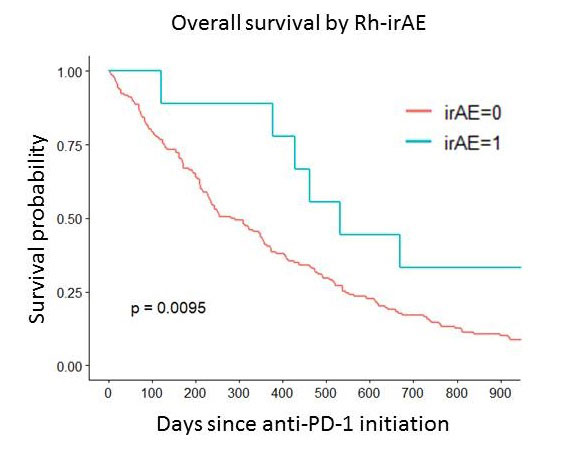Session Information
Date: Tuesday, November 12, 2019
Title: Miscellanous Rheumatic & Inflammatory Disease Poster III: Autoimmune Conditions and Therapies
Session Type: Poster Session (Tuesday)
Session Time: 9:00AM-11:00AM
Background/Purpose: The development of de novo inflammatory arthritis (IA) occurs in 2-4% of all patients with cancer treated with programmed cell death protein 1 (PD-1) inhibitors. (1) Prognosis remains a major concern for managing physicians, particularly given the potential for immunosuppressive medications to impact the anti-tumor response. The objective of this study is to assess the overall survival of patients with melanoma who develop anti-PD-1 associated IA.
Methods: From a database of all patients who received any PD-1 inhibitor at the Mayo Clinic Rochester, Minnesota campus between January 1st, 2011 and May 1st, 2018, we identified those with metastatic melanoma and new-onset inflammatory arthritis using diagnostic codes, search terms, and manual chart review. A Cox proportional hazard model was used to examine overall survival using R statistical software.
Results: Of the 394 patients with stage IV melanoma who received any PD-1 inhibitor, 27 (6.9%) were diagnosed with inflammatory arthritis representing a rheumatic immune-related adverse effect (Rh-irAE). Mean age upon starting anti-PD-1 therapy was 62.4 (SD=13.9) and 39% of patient were female. There were no statistically significant differences in age or sex between patients with and without IA. Average duration of anti-PD-1 therapy was 225 days (SD=279) with no significant differences between groups. IA was most often polyarticular (74%) and was treated with systemic glucocorticoids in 82% of cases for a mean duration of 210 days (SD=221). Six patients (22%) were treated with disease modifying drugs and three patients (11%) required permanent anti-PD-1 discontinuation due to severe symptoms. The development of IA correlated significantly with increased overall survival (HR 0.39, 95% CI=0.19-0.81).
Conclusion: This study shows a significant survival benefit associated with the development of anti-PD-1 associated IA in patients with metastatic melanoma. The prevalence of IA was higher than previous reports on rheumatic irAEs.
- Richter MD, Crowson C, Kottschade LA, Finnes HD, Markovic SN, Thanarajasingam U. Rheumatic Syndromes Associated With Immune Checkpoint Inhibitors: A Single-Center Cohort of Sixty-One Patients. Arthritis Rheumatol. 2019;71(3):468-475.
To cite this abstract in AMA style:
Richter M, Orme J, Finnes H, Thanarajasingam U. Overall Survival in Patients with PD-1 Inhibitor-related Inflammatory Arthritis and Metastatic Melanoma [abstract]. Arthritis Rheumatol. 2019; 71 (suppl 10). https://acrabstracts.org/abstract/overall-survival-in-patients-with-pd-1-inhibitor-related-inflammatory-arthritis-and-metastatic-melanoma/. Accessed .« Back to 2019 ACR/ARP Annual Meeting
ACR Meeting Abstracts - https://acrabstracts.org/abstract/overall-survival-in-patients-with-pd-1-inhibitor-related-inflammatory-arthritis-and-metastatic-melanoma/

